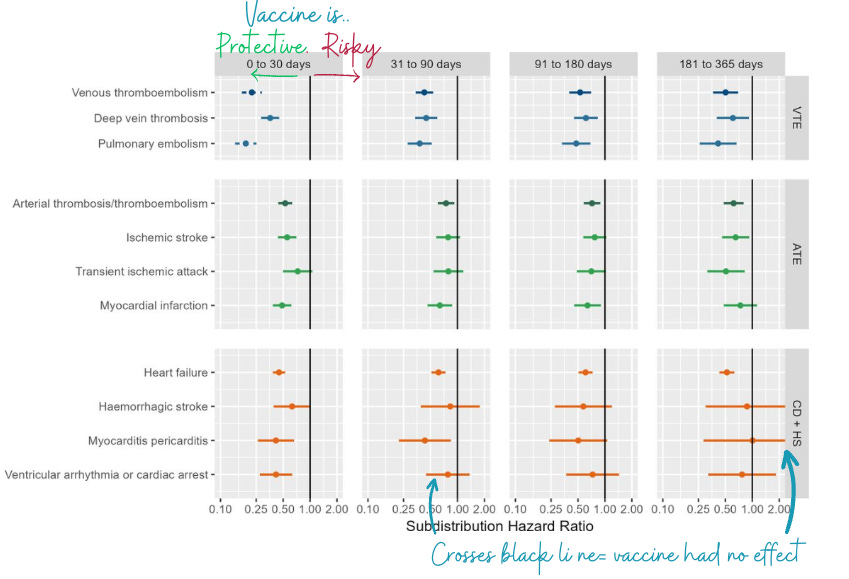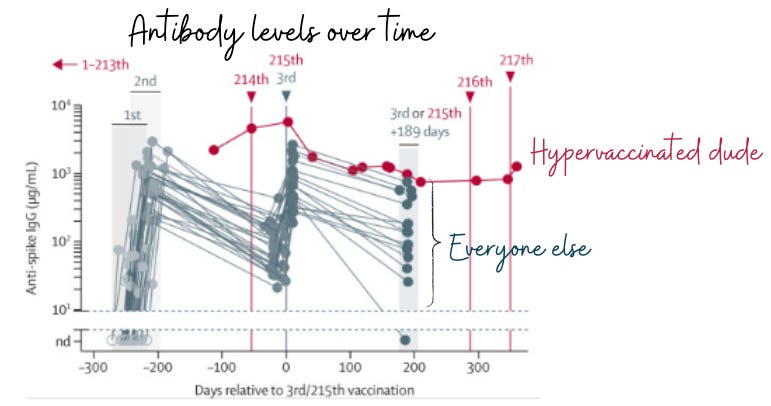Virus Research Roundup
A dude gets 217 Covid-19 vaccines, more on long Covid, and Sweden opinions.
Several new (and fascinating) scientific developments have peppered the public health stratosphere in the last few weeks. Some of this might be useful to you.
Major cardiovascular benefits of getting Covid-19 vaccine
What we knew: Previous studies have tangled the relationship between SARS-CoV-2 infection, Covid-19 vaccines, and cardiac complications. Moreover, studies are scarce during the latest Omicron period.
New info? A new study found risk of all adverse heart events (heart attack, strokes, etc., including myocarditis) was significantly lower after infection among vaccinated people, compared to unvaccinated people. This lasted for up to 12 months for most heart outcomes. While this is not a randomized control trial, it’s an impressive study—they compared 10 million vaccinated to 10 million unvaccinated people with some nice, clean analyses. I was disappointed, though, that they didn’t assess differences in this relationship by age.

Why does this matter? Staying up-to-date on vaccinations has an added benefit: preserving heart health. This is likely explained by vaccines preventing infection and severe disease.
Iron and long Covid: A potential path for treatment?
What we knew: One of the immune system’s tricks for dealing with infections is hiding the body’s iron supply so that germs can’t use the nutrient to thrive. However, if this goes on too long, it can cause anemia (insufficient red blood cells to get oxygen to your tissues).
New info? A new study found that a person’s iron status after COVID-19 infection can predict the severity of illness and long COVID. People who do not develop long COVID tend to have a normal iron status over the weeks following infection.
Why does this matter? Iron may account for some of the consequences of long COVID-19. This opens up the door to trying therapeutics. However, whether the change in iron status causes or is caused by long COVID-19 is unclear.
Dude got 217 COVID-19 vaccines
What we knew: The benefit-risk profile of COVID-19 vaccines has always been favorable, especially for older adults. Still, how many vaccines are too many? Theoretically, repeat vaccination could teach the immune system to tolerate vaccines and stop working, just as weekly allergy shots teach the immune system to tolerate allergens.
New info? Outside the context of research, for his own reasons, and against recommendations, a German man received 217 Covid-19 vaccines over 29 months. (More than half of the vaccinations were verified.) When scientists asked to study his immune system, they found it didn’t learn to tolerate the vaccine—he had modestly higher antibody levels than people with three doses. Also, his immunity to other things seemed unaffected, and he’s never had a COVID-19 infection (as far as we can tell).

Why does this matter? This study made many headlines. But be careful with generalizations, given this is one person in an extreme scenario. It provides insights for scientists, though, into how the immune system works and opens the door to understanding how to reproduce the positive effects with much smaller doses.
RSV monoclonal antibodies are effective
What we knew: Clinical trials showed that RSV monoclonal antibodies (a drug) for infants were highly effective. However, we didn't have real-world data.
New info? Scientists in Spain found the RSV drug protected against hospitalization by at least 70%. Some regions had upwards of 97% effectiveness. CDC also published a similar study boasting a 90% effectiveness against RSV hospitalization.
Why does this matter? Only 40% of babies got protection this last season. Low rates were in large part due to access issues, but some was due to hesitancy. I hope this increases confidence for next season.
Trial for RSV vaccine in pregnancy stopped: Now we know why
What we knew: Pfizer has a safe and effective RSV vaccine for pregnant women, and many took it this last fall. GSK was also working on an RSV vaccine but had to stop the clinical trial early, and it was not made available.
New info? The data underlying the decision to stop the GSK clinical trial was just published:
Preterm births were higher in vaccine group vs. placebo (6.8% vs. 4.9%)
Of the preterm births, 5.5% of those in the vaccine group were very (<32 weeks) or extremely (<28 weeks) preterm, compared with 2.3% of the placebo group.
There was a higher risk of neonatal death in the vaccine group because of the extreme prematurity.
Why does this matter? Scientists need to understand why this particular vaccine has this problem so that future vaccines can avoid it.
Bottom line
Scientific evidence continues to flow in, providing a few reassuring puzzle pieces and some remaining mysteries.
Have a great weekend! YLE
Big thanks to Edward Nirenberg, who helped gather some of these studies and “translate” the science.
“Your Local Epidemiologist (YLE)” is written by Dr. Katelyn Jetelina, M.P.H. Ph.D.—an epidemiologist, wife, and mom of two little girls. During the day, she is a senior scientific consultant to several organizations, including CDC. At night, she writes this newsletter. Her main goal is to “translate” the ever-evolving public health world so that people will be well-equipped to make evidence-based decisions. This newsletter is free, thanks to the generous support of fellow YLE community members. To support this effort, subscribe below:





I love the format of today's newsletter: what we knew? new info? why does this matter? it makes it very easy to focus and highlight what's new and important and why. I wish medical journals did this more often
After your last several posts, I wanted to share a clear, empathetic and actionable post from The Nerdy Girls on the new isolation guidelines.
https://open.substack.com/pub/thosenerdygirls/p/what-should-i-do-if-i-get-sick-the?r=6q5yk&utm_campaign=post&utm_medium=email
Off topic but relevant to clear, helpful health policy information.